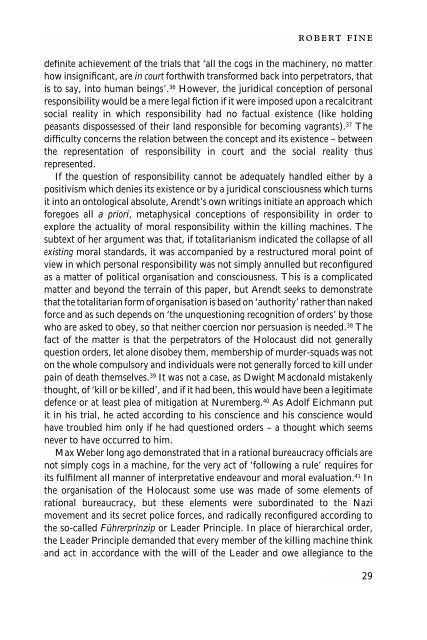Create successful ePaper yourself
Turn your PDF publications into a flip-book with our unique Google optimized e-Paper software.
obert fine<br />
definite achievement of <strong>the</strong> trials that ‘all <strong>the</strong> cogs in <strong>the</strong> machinery, no matter<br />
how insignificant, are in court forthwith transformed back into perpetrators, that<br />
is to say, into human beings’. 36 However, <strong>the</strong> juridical conception of personal<br />
responsibility would be a mere legal fiction if it were imposed upon a recalcitrant<br />
social reality in which responsibility had no factual existence (like holding<br />
peasants dispossessed of <strong>the</strong>ir land responsible for becoming vagrants). 37 The<br />
difficulty concerns <strong>the</strong> relation between <strong>the</strong> concept and its existence – between<br />
<strong>the</strong> representation of responsibility in court and <strong>the</strong> social reality thus<br />
represented.<br />
If <strong>the</strong> question of responsibility cannot be adequately handled ei<strong>the</strong>r by a<br />
positivism which denies its existence or by a juridical consciousness which turns<br />
it into an ontological absolute, Arendt’s own writings initiate an approach which<br />
foregoes all a priori, metaphysical conceptions of responsibility in order to<br />
explore <strong>the</strong> actuality of moral responsibility within <strong>the</strong> killing machines. The<br />
subtext of her argument was that, if totalitarianism indicated <strong>the</strong> collapse of all<br />
existing moral standards, it was accompanied by a restructured moral point of<br />
view in which personal responsibility was not simply annulled but reconfigured<br />
as a matter of political organisation and consciousness. This is a complicated<br />
matter and beyond <strong>the</strong> terrain of this paper, but Arendt seeks to demonstrate<br />
that <strong>the</strong> totalitarian form of organisation is based on ‘authority’ ra<strong>the</strong>r than naked<br />
force and as such depends on ‘<strong>the</strong> unquestioning recognition of orders’ by those<br />
who are asked to obey, so that nei<strong>the</strong>r coercion nor persuasion is needed. 38 The<br />
fact of <strong>the</strong> matter is that <strong>the</strong> perpetrators of <strong>the</strong> <strong>Holocaust</strong> did not generally<br />
question orders, let alone disobey <strong>the</strong>m, membership of murder-squads was not<br />
on <strong>the</strong> whole compulsory and individuals were not generally forced to kill under<br />
pain of death <strong>the</strong>mselves. 39 It was not a case, as Dwight Macdonald mistakenly<br />
thought, of ‘kill or be killed’, and if it had been, this would have been a legitimate<br />
defence or at least plea of mitigation at Nuremberg. 40 As Adolf Eichmann put<br />
it in his trial, he acted according to his conscience and his conscience would<br />
have troubled him only if he had questioned orders – a thought which seems<br />
never to have occurred to him.<br />
Max Weber long ago demonstrated that in a rational bureaucracy officials are<br />
not simply cogs in a machine, for <strong>the</strong> very act of ‘following a rule’ requires for<br />
its fulfilment all manner of interpretative endeavour and moral evaluation. 41 In<br />
<strong>the</strong> organisation of <strong>the</strong> <strong>Holocaust</strong> some use was made of some elements of<br />
rational bureaucracy, but <strong>the</strong>se elements were subordinated to <strong>the</strong> Nazi<br />
movement and its secret police forces, and radically reconfigured according to<br />
<strong>the</strong> so-called Führerprinzip or Leader Principle. In place of hierarchical order,<br />
<strong>the</strong> Leader Principle demanded that every member of <strong>the</strong> killing machine think<br />
and act in accordance with <strong>the</strong> will of <strong>the</strong> Leader and owe allegiance to <strong>the</strong><br />
29

















